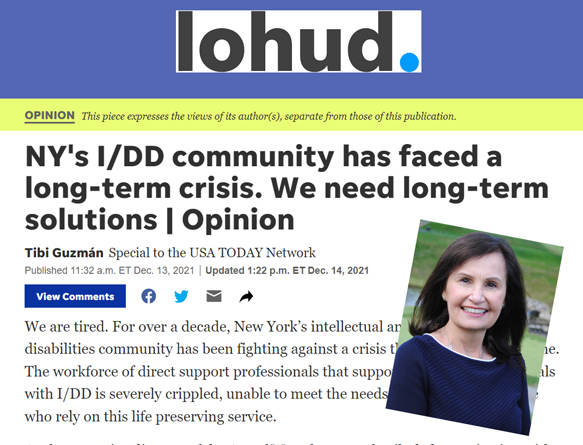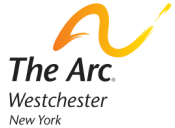
Executive Director & CEO Tibi Guzmán on long-term solutions for NY’s I/DD Community
For over a decade, New York’s intellectual and developmental disabilities community has been fighting against a crisis that we cannot beat alone. The workforce of direct support professionals that support New York’s individuals with I/DD is severely crippled, unable to meet the needs of our most vulnerable who rely on this life preserving service.
As the executive director of The Arc Westchester, a family-led organization with the mission to empower and provide support to over 2,000 individuals with I/DD across Westchester County, I see the desperation and constant burden of worry in our community every single day. While we are optimistic about working alongside a new administration in Albany, every day of inaction is another day our community suffers through this crisis.
In the news, we read about the national workforce crisis daily. Restaurants cannot hire workers, bus companies cannot find drivers, there are worker shortages throughout the health and human service industries, and droves of employees continue to resign from their jobs in record numbers. This is not breaking news for our community – I /DD residential providers have seen this trend for years. Now, different industries are feeling the pain we know all too well – the inability to recruit staff and provide lifesaving services to those who need us the most.
Unsurprisingly, the COVID-19 pandemic has exacerbated our already existing workforce shortage into a full-blown crisis. A recent survey (https://nydisabilityadvocates.com/workforce/) of nonprofit organizations providing direct support services found nearly 25% of their staff positions across the state are vacant on average — an increase of almost 75% since before the pandemic. A staggering 93% of provider organizations have seen their number of job applicants drop. The Hudson Valley region alone is no exception and currently holds a vacancy rate of more than 22%.
The first step to solve this crisis is to compensate DSPs appropriately for the selfless work that they provide. Due to the workforce crisis, our staff have had to take on multiple shifts in addition to having multiple jobs to make ends meets and provide for their families. DSPs provide critical and personal hands-on care. Tasks such as lifting and moving people, preparing meals, administering medication, among countless others, are lifesaving for individuals with I/DD. Without a doubt, DSPs are essential workers, yet they are not treated as such by the state.
Unfortunately, provider agencies like mine must look toward New York State to help us provide living wages, as almost 100% of DSP salaries comes from the state funding. The reality is we cannot compete with food or retail jobs, which offer the same amount or more pay for less demanding work. Too often am I seeing my colleagues around the state closing vital programs because of a lack of staff. The I/DD community is in desperate need of stabilization funding to help organizations provide a living wage for the direct support professionals that serve over 140,000 thousand New Yorkers with disabilities.
Gov. Kathy Hochul’s recent announcement of Federal approval for the State’s enhanced Federal Medical Assistance Percentage plan, which includes $1.5 billion to support the retention, and vaccination bonuses for Direct Support Professionals, is an essential first step in the right direction of solving this crisis. However, without long term solutions, this crisis will persist and the safety and health of people with developmental disabilities will remain in constant jeopardy. The New York State legislature and Hochul must make the I/DD community a priority in the upcoming budget.
Throughout the pandemic Direct Support Professionals continued to put their own lives at risk to care for our most vulnerable neighbors, friends, and family members. The I/DD community may be tired, but like our Direct Support Professionals, we will never stop working to help those that rely on us during their greatest times of need.
